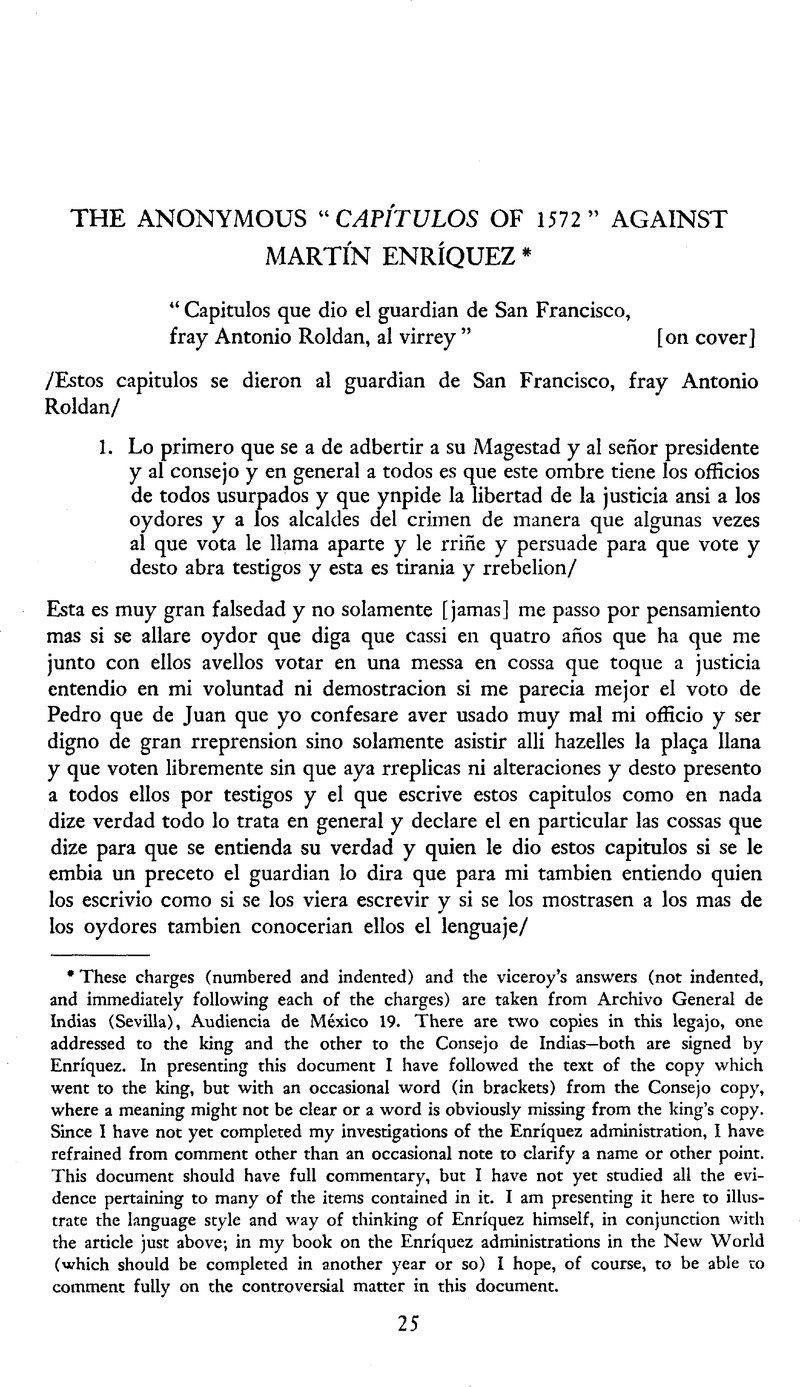Article contents
The Anonymous “Capítulos of 1572” Against Martín Enríquez *
Published online by Cambridge University Press: 11 December 2015
Abstract

- Type
- Document
- Information
- Copyright
- Copyright © Academy of American Franciscan History 1957
Footnotes
These charges (numbered and indented) and the viceroy’s answers (not indented, and immediately following each of the charges) are taken from Archivo General de Indias (Sevilla), Audiencia de México 19. There are two copies in this legajo, one addressed to the king and the other to the Consejo de Indias—both are signed by Enríquez. In presenting this document I have followed the text of the copy which went to the king, but with an occasional word (in brackets) from the Consejo copy, where a meaning might not be clear or a word is obviously missing from the king’s copy. Since I have not yet completed my investigations of the Enríquez administration, I have refrained from comment other than an occasional note to clarify a name or other point. This document should have full commentary, but I have not yet studied all the evidence pertaining to many of the items contained in it. I am presenting it here to illustrate the language style and way of thinking of Enríquez himself, in conjunction with the article just above; in my book on the Enríquez administrations in the New World (which should be completed in another year or so) I hope, of course, to be able to comment fully on the controversial matter in this document.
References
1 Alonso de Villaseca, a man reputed to be the wealthiest, or one of the wealthiest, miners and landowners in New Spain.
2 This is at least partially true, and it is in capítulo 49 of the king’s instructions to Enríquez, dated at Aranjuez, June 7, 1568 (AGI, Aud. Mex. 1089). But there is the loophole that the king could approve such appointments, and Enríquez apparently sought royal approval in giving posts to his criados (see, for example, notes 55–58, above).
3 John Hawkins.
4 If the date May 23, 1572 is correct for the “Capítulos” (it is thus written in the upper right hand corner of page one of the copy sent the king, though in a hand and ink differing from the rest of the document), as it appears to be from a letter of May 28, 1572, which Enríquez wrote the king (see below), it is difficult to see how he could here be referring to the first group of Jesuits, for they did not leave Spain until June, 1572. In seeming confirmation of the May 23 date, herewith a brief letter of Enríquez to the king, May 28, 1572, from AGI, Aud. Mex. 1%
“Despues de partida la flota me dieron estos Capítulos y si el que con tanto cuydado los escrivio y procuro que fuesen a manos de V. M. no salio con ello / o se perdieron quiero yo dalle este contentamiento y embiallos para que consiga el fin de su buena intención mas lo que en ellos va escripto no tengo que dezir sino que dios y V. M. lo juzguen e yo reciba la merced que sufrir y pasar por tales cosas merece y pues estos an de ser públicos justo es que lo sea y entienda el mundo la merced que de V. M. recibo que tengo esta por mayor servicio que pasar mar y tierra y dexar muger y hijos y deudos y amigos. Guarde, etc.”
- 1
- Cited by


